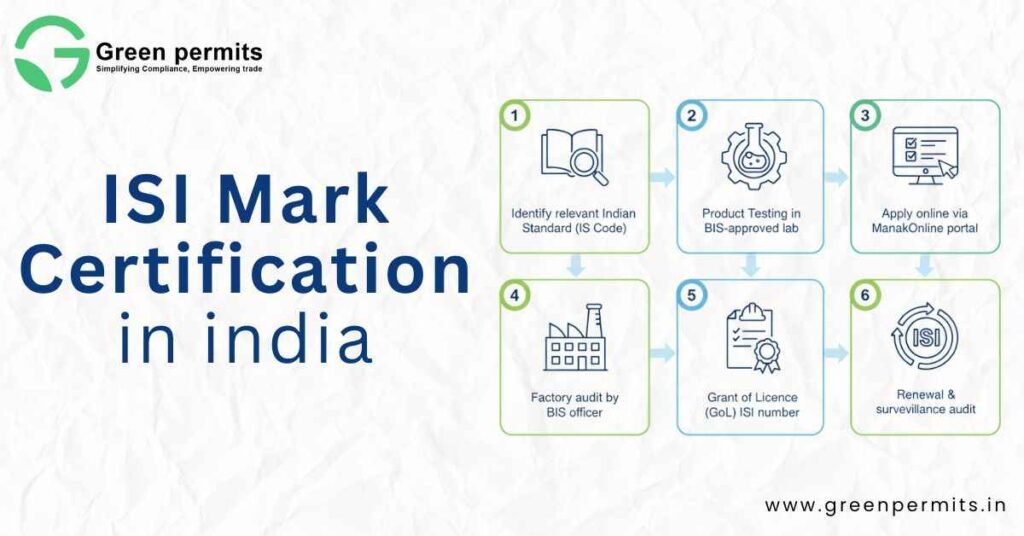In early 2025, a small water purifier manufacturer in Pune had just cracked a deal with a major retail chain. Everything looked perfect—the product worked flawlessly, the packaging was ready, and the containers were sealed for dispatch.
Then came the call from customs: “Your consignment is being held — no ISI mark found.”
The team scrambled to explain that their product had passed every quality test. But without an official BIS licence under Scheme-I (ISI mark), the shipment couldn’t move. They lost two months and nearly ₹40 lakh in costs and penalties.
That single delay became their wake-up call — that BIS certification isn’t just paperwork; it’s your passport to India’s regulated market.

The ISI Mark, managed by the Bureau of Indian Standards (BIS), is India’s official stamp of product quality and safety. It’s required for products that fall under government-issued Quality Control Orders (QCOs)—ranging from cement, steel, and household appliances to footwear and packaged drinking water.
Having an ISI mark isn’t optional; it’s legally mandatory for hundreds of product categories. For a manufacturer, this mark means:
Think of it as your product’s “entry visa” into Indian markets. Without it, you risk losing contracts, tenders, and retail distribution rights overnight.
Over the past three years, the Ministry of Commerce and Industry (MoCI) and DPIIT have made BIS certification mandatory across multiple sectors.
In 2024–25 alone, over 50 new QCOs were issued covering:
Ignoring ISI certification is no longer an option—it’s tied directly to customs clearance, e-commerce listings, and even brand reputation.
You must obtain an ISI licence if you are:
Every product under BIS certification corresponds to a unique IS number.
For example:
Start by checking the latest list of notified Indian Standards and corresponding QCOs on the official BIS website.
Before applying, your product must undergo testing at a BIS-recognised lab to confirm compliance with the relevant IS standard.
All applications are submitted digitally via www.manakonline.in.
Prepare and upload:
After preliminary review, BIS conducts a Factory Inspection to verify:
If you don’t have full testing infrastructure, BIS allows outsourced testing, provided traceability and documentation are strong.
Once the inspection and documents are verified, BIS issues your licence.
Green Permits Tip: Maintain a “Compliance Binder” — a single folder with calibration records, internal tests, and vendor certifications. It speeds up renewal audits significantly.
Here’s a consolidated view of the official BIS fees and rebates for domestic manufacturers:
| Fee Type | Standard Fee | MSME / Startup Rebate* | Frequency |
|---|---|---|---|
| Application Fee | ₹ 1,000 | No change | One-time |
| Licence Fee | ₹ 1,000 per IS | No change | One-time per product |
| Testing Fee | ₹ 25,000 – ₹ 1,00,000 (approx., varies by IS) | 10–20% rebate via MSME labs | Per product |
| Marking Fee (to BIS) | ₹ 0.40 – ₹ 8.00 per unit or ₹ 1.50 – ₹ 50 per MT | 80% rebate for Micro, 20% for Small/Medium enterprises, valid till 31 May 2026 | Annual |
| Renewal Fee | ₹ 1,000 + marking fee balance | Same | Every 2–5 years |
*As per BIS Notification No. CMD-I/1:07/March-2024 and Fee Circular 2023–24.
Estimated Total Cost: ₹40,000 – ₹1.5 lakh per product, depending on product complexity and factory readiness.
| Stage | Approx. Duration |
|---|---|
| Product Testing | 10–15 working days |
| Application Review | 15 days |
| Factory Inspection | 10–20 days |
| Licence Grant | 5–10 days |
| Total Average Timeline | 30–45 working days |
BIS may fast-track approval for simple products or renewals with good compliance history.
Under Section 29 of the BIS Act, 2016:
In short: the cost of non-compliance can exceed the cost of certification tenfold.
| Product Category | IS Standard | Effective Date | Governing Ministry |
|---|---|---|---|
| Footwear (Leather, PU, Sports) | IS 15844 / IS 5676 | 01 Oct 2025 | DPIIT |
| Electrical Fans | IS 374 | 01 Apr 2024 | MoCI |
| Packaged Drinking Water | IS 14543 | Active | FSSAI/BIS |
| Pressure Cookers | IS 2347 | 2024 | DPIIT |
| Steel Rebars | IS 1786 | Ongoing | MoS |
| Cement (PPC, OPC) | IS 1489, IS 269 | Ongoing | DPIIT |
(Source: BIS Quality Control Orders 2024–25)
When a consumer buys a ceiling fan or a packet of cement, they rarely check who manufactured it — but they always notice the ISI mark.
That small triangle symbol tells them, “This is tested, safe, and approved by the Government of India.”
For manufacturers, that symbol does more than prove compliance; it opens doors.
At Green Permits, we help Indian and foreign manufacturers navigate the entire BIS certification journey:
Whether you’re setting up a new plant or expanding to a new product category, our experts ensure that your ISI mark journey is smooth, transparent, and time-bound.
BIS ISI certification is no longer a bureaucratic checkbox — it’s the foundation of your product’s credibility in India’s competitive market.
Delays, rejections, or non-compliance can stop an entire supply chain. But with the right guidance, you can secure your licence, build trust, and scale faster.
📞 +91 78350 06182
📧 wecare@greenpermits.in
Book a Consultation with Green Permits — your partner for BIS, EPR, and sustainability compliance in India.
The ISI mark confirms that a product meets Indian safety and quality standards. It’s mandatory under BIS and gives legal access to Indian and export markets.
Yes. All manufacturers under a QCO must get ISI certification. MSMEs get up to 80% fee rebate till May 2026 under BIS concessions.
Penalties include fines up to ₹2 lakh, imprisonment up to two years, and product seizure.
Generally 30–45 days, depending on testing and inspection schedules.